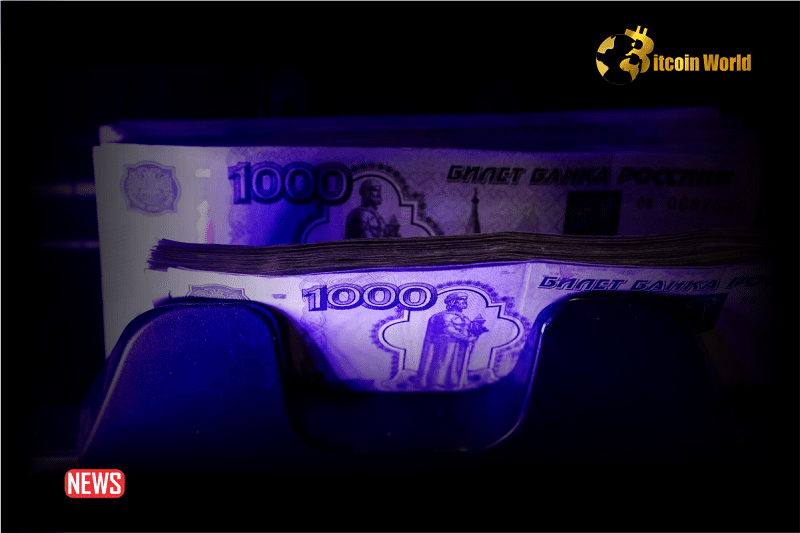Hold onto your hats, folks! In a surprising twist in the world of finance, the Russian Ruble has pulled off a stunning comeback against the mighty US dollar. Yes, you read that right. While many expected the Ruble to struggle under the weight of economic sanctions, November saw it unexpectedly surge by a remarkable 12% against the USD. Let’s dive into this fascinating development and explore what’s fueling this Ruble resurgence.
- In November, the Russian ruble surprisingly surged by 12% against the US dollar, defying economic sanctions.
- The ruble faced challenges recently but gained strength as uncertainty about the Federal Reserve’s interest rate policy grew.
- Russia, a BRICS member, employed strategies like suspending US dollar exchanges and active currency trades to support the ruble.
For those keeping an eye on global currency trends, especially in the context of BRICS nations and international finance, this is a headline-grabbing event. How did the Ruble manage to outshine the US dollar this month, especially considering the ongoing economic pressures?
Over just the past couple of weeks, the Russian ruble has shown incredible strength, achieving that impressive 12% jump. This is noteworthy because while the US dollar has held its ground, and even strengthened, against currencies of other BRICS nations, it’s been a different story with the Ruble. The Russian currency has clearly been on an upward trajectory in November.
Ruble’s Resilience: What’s the Secret Sauce?
Let’s rewind a bit. Just last month, the Russian Ruble was facing headwinds. It had actually dipped to a low point, hitting an exchange rate of 100.50 against the US dollar. During that period, the USD was flexing its muscles across the board – against various currencies, commodities, and even gold. It seemed like the dollar was in control.
However, November brought a shift in dynamics. What changed? Well, a couple of key factors came into play:
- Federal Reserve Uncertainty: Growing uncertainty about the US Federal Reserve’s future decisions on interest rates started to weigh on the US dollar. Markets dislike uncertainty, and this created an opening for other currencies.
- Rising Unemployment Concerns: Simultaneously, concerning unemployment data emerged in the US, further weakening the dollar’s position. Economic jitters can quickly impact currency values.
These factors created a window of opportunity, but Russia also actively took steps to bolster its currency. Being a key member of the BRICS economic bloc, Russia has been strategically maneuvering in the global financial landscape.
So, what exactly did Russia do to safeguard and strengthen the Ruble?
Strategic Moves: How Russia Propped Up the Ruble
Russia didn’t just sit back and watch market forces at play. They actively intervened in the currency and foreign exchange markets to give the Ruble a boost. Here are some of the key strategies employed:
- Temporary Suspension of USD Exchanges: In a significant move, the Central Bank of Russia temporarily halted US dollar exchanges in foreign currency markets throughout the country. Think about it – reducing the availability of USD can naturally increase demand and potentially the value of the Ruble in those exchanges.
- Increased Ruble Trading: This suspension led to a direct consequence – a surge in trading activity involving the Russian Ruble. With less USD available for exchange, the focus shifted to Ruble transactions, further supporting its value.
Read Also: Mastercard: Customers Are Too Comfortable With Today’s Money To Adopt CBDCs
Currency Intervention in Action
Beyond just suspending USD exchanges, Russia also engaged in active currency trading, particularly focusing on pairs involving the Ruble and the Chinese Yuan. This is interesting given the growing economic ties between Russia and China, especially within the BRICS framework.
Let’s look at a specific example:
On November 3rd, Russia injected 0.8 billion rubles into the currency market. While this sounds like a large number in rubles, it’s approximately $8.7 million USD. This injection was strategically timed and aimed to influence the Ruble’s exchange rate.
Reports then surfaced indicating that Russia followed up with substantial volumes of both ‘buy’ and ‘sell’ orders for their own currency. This active participation in the market, strategically placing orders, is a direct way to shape the Ruble’s value.
Ruble’s Future: A Sustainable Surge?
The Russian Ruble’s recent performance is undoubtedly a noteworthy financial achievement, largely driven by these deliberate interventions and strategic actions. It shows that even in the face of significant external pressures, countries can take measures to influence their currency’s trajectory.
However, it’s crucial to maintain a balanced perspective. While these measures have provided a temporary boost and demonstrated resilience, questions remain about the long-term sustainability. The US dollar remains a dominant force in international finance, and the global currency exchange market is inherently dynamic and influenced by a multitude of factors.
Think of it like this: currency markets are constantly in motion, reacting to economic data, geopolitical events, and investor sentiment. What works today might face new challenges tomorrow.
Key Takeaways:
- Strategic Intervention: Russia’s active intervention in currency markets played a crucial role in the Ruble’s November surge.
- External Factors: Uncertainty surrounding US Federal Reserve policy and rising unemployment in the US weakened the dollar, creating an opportunity for the Ruble.
- BRICS Context: Russia’s actions occur within the broader context of BRICS nations seeking greater financial autonomy and challenging traditional Western dominance.
- Volatility Remains: Currency markets are volatile. While the Ruble is currently strong, future performance is subject to change.
As November continues, the financial world will be closely watching the Ruble’s performance and the evolving dynamics of the global currency landscape. The Ruble’s story is a compelling reminder of the complexities and strategic maneuvers that shape international finance. While the Ruble is shining brightly now, the future of currency markets is always a story still being written.
Disclaimer: The information provided is not trading advice, Bitcoinworld.co.in holds no liability for any investments made based on the information provided on this page. We strongly recommend independent research and/or consultation with a qualified professional before making any investment decisions.




